
Informix Data Audit Trail
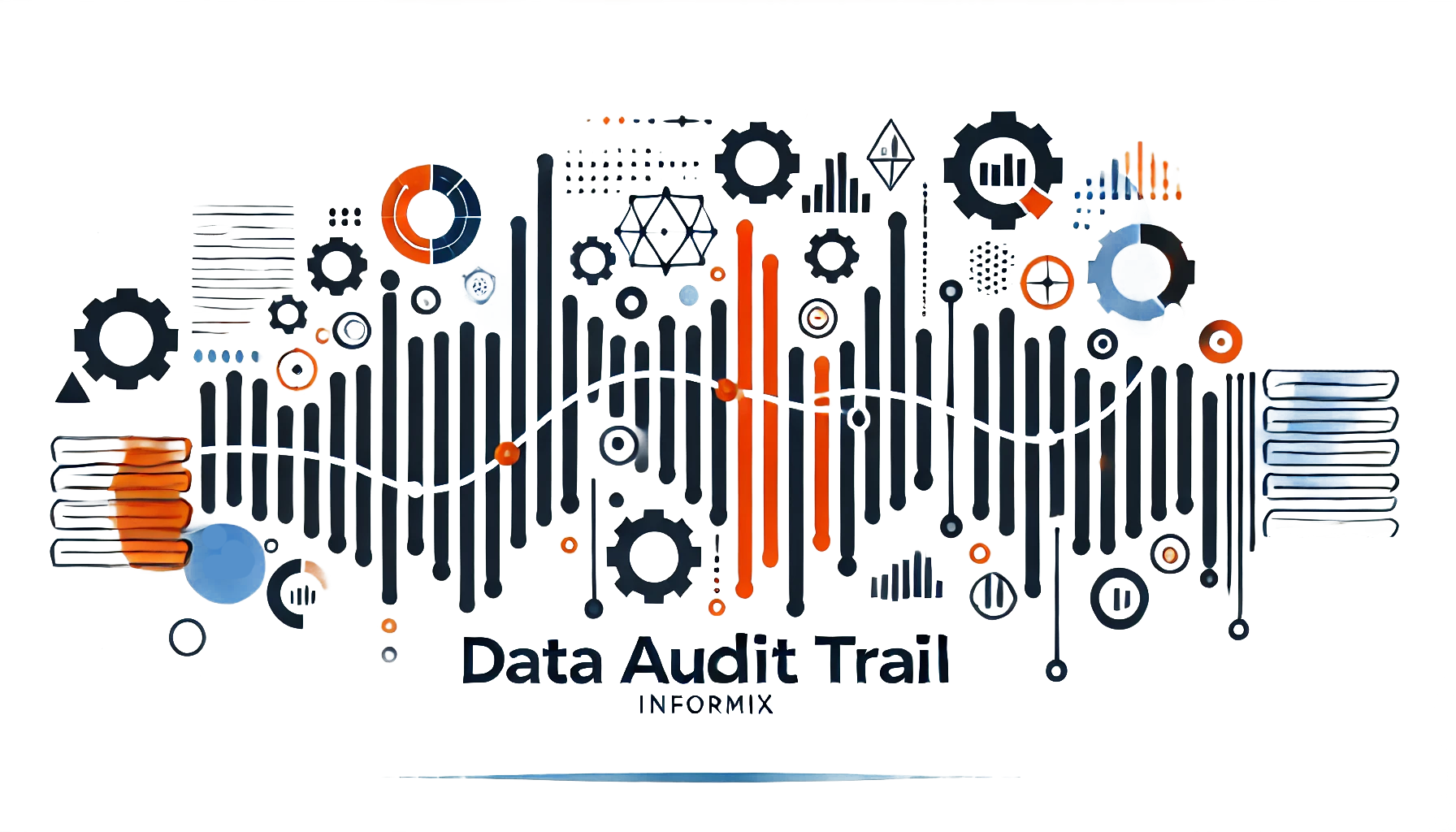
Introduction
Setting up and keeping a reliable data audit trail for Informix and other databases is important for data security. It helps protect sensitive information and carefully tracks who has access.
IBM Informix equips organizations with native auditing tools to monitor data access and modifications effectively. However, native solutions often leave room for improvement. So that's why in this article, we’ll take a closer look at how Informix’s built-in audit trails function and explore how DataSunrise can enhance your auditing practices by providing deeper insights and real-time monitoring capabilities.
Overview of Native Informix Data Audit Trail
The Informix data audit trail system creates detailed logs of database operations using the built-in onaudit utility. These audit trails capture a wide range of events, from basic user authentication to complex data modifications, creating a chronological record of all database activities. By properly configuring audit trails, organizations can maintain a complete history of who accessed what data, when they accessed it, and what changes were made.
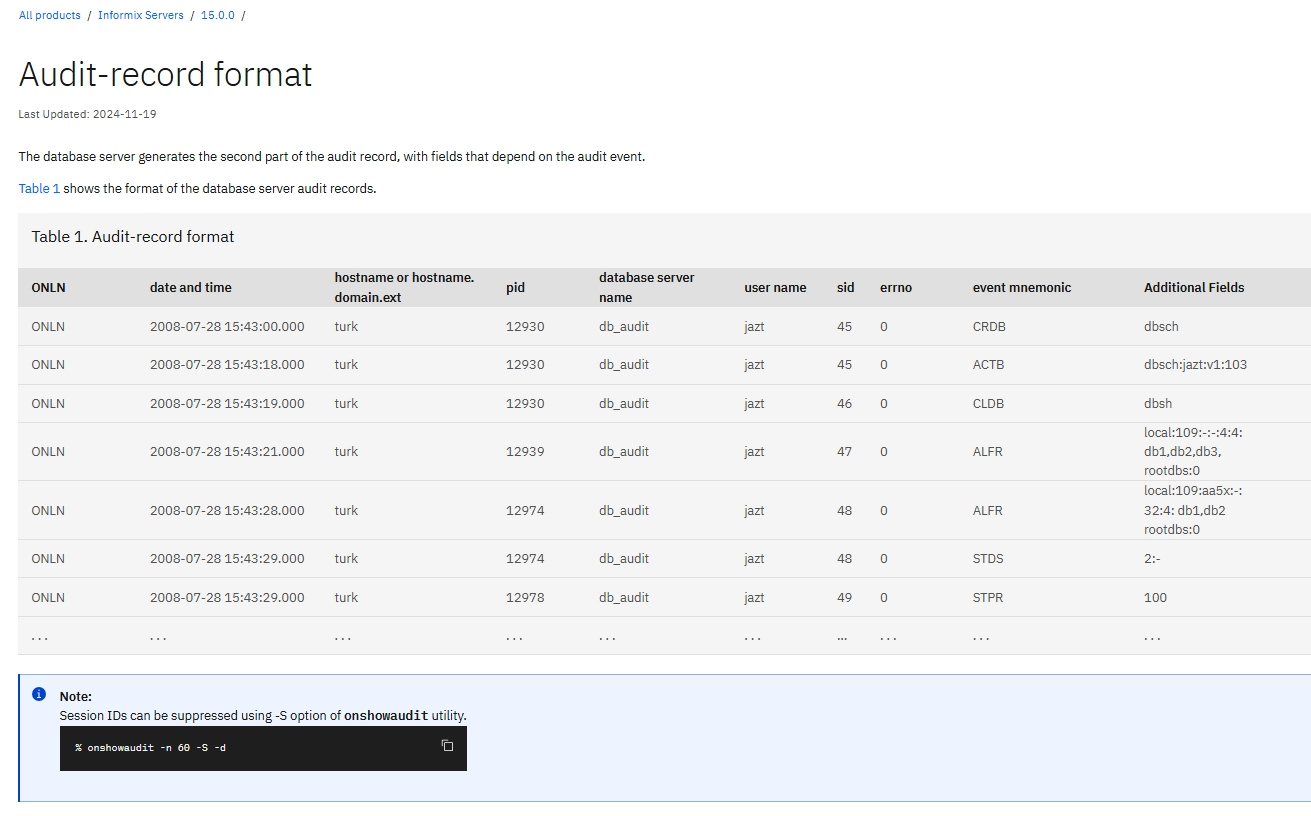
How Informix Data Audit Trail Works
The Informix data audit trail system operates through the onaudit utility, which writes detailed event logs to audit trail files. These trails maintain records of:
- Access Trail Records: Captures who accessed specific tables and columns
- Operation Trail Records: Documents all data modifications and structural changes
- Authentication Trail Records: Logs all user login attempts and session activities
The onaudit tool allows administrators to define the scope and detail level of audit trails through audit masks, which specify exactly what information should be captured in the trail. You can configure these audit masks to track specific database objects, users, or types of operations, providing granular control over audit trail content while managing storage and performance impact.
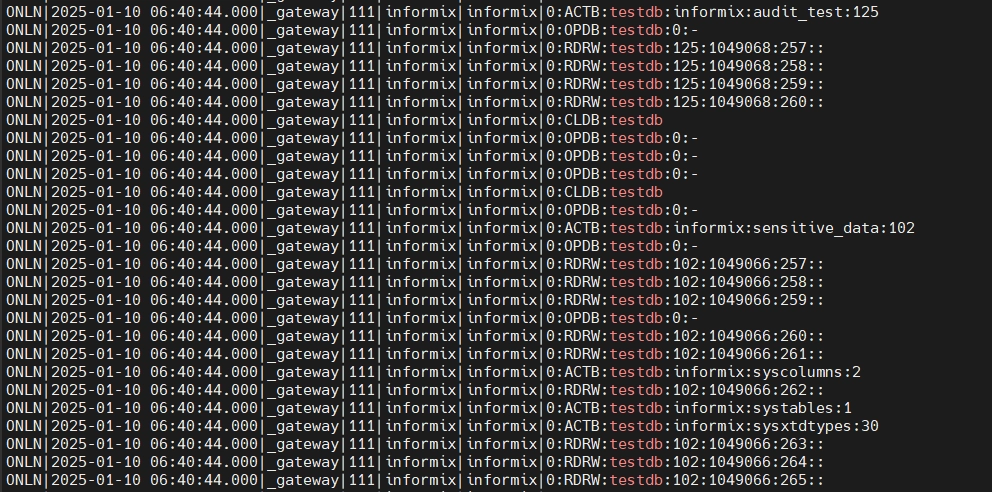
For more details, you can refer to the official documentation for the Informix onaudit utility.
Evaluating Informix Data Audit Trail with the onaudit Tool
While Informix's native audit trail capabilities provide essential monitoring functionality through the onaudit tool, it's important to understand both its strengths and limitations when planning your database security strategy.
To provide a clearer understanding of Informix’s audit tools and their associated limitations, the following table offers a detailed comparison of its features and constraints:
| Features | Limitations |
|---|---|
| Configurable audit levels for different types of database activities | Limited storage management for audit logs |
| Real-time monitoring of user sessions and authentication attempts | Basic reporting capabilities requiring additional tools for advanced analysis |
| Detailed tracking of DDL (Data Definition Language) operations | No built-in alert mechanisms for suspicious activities |
| Ability to audit specific database objects and users | Limited filtering options during log generation (most filtering must be done post-collection) |
| Built-in filtering capabilities for audit records | Manual rotation of audit files required |
| Integration with Informix server security framework | No native encryption of audit logs |
| Support for custom audit masks to specify which operations to track | Limited options for real-time log streaming to external systems |
| Minimal performance impact when configured properly | Basic format of audit records, with no native support for modern formats like JSON |
Integrating DataSunrise for Extensive Informix Data Audit Trails
While Informix provides native auditing features, DataSunrise enhances the auditing process by offering a user-friendly interface and additional capabilities, such as centralized control over auditing rules, easy rule creation, and comprehensive data audit trail visualizations. Here’s a brief guide on how to set up DataSunrise for auditing Informix data:
Step 1: Connect to Informix Database via DataSunrise
Once DataSunrise is installed, you can connect it to your Informix database instance. This is done by specifying the host, port, and login credentials for your Informix server.
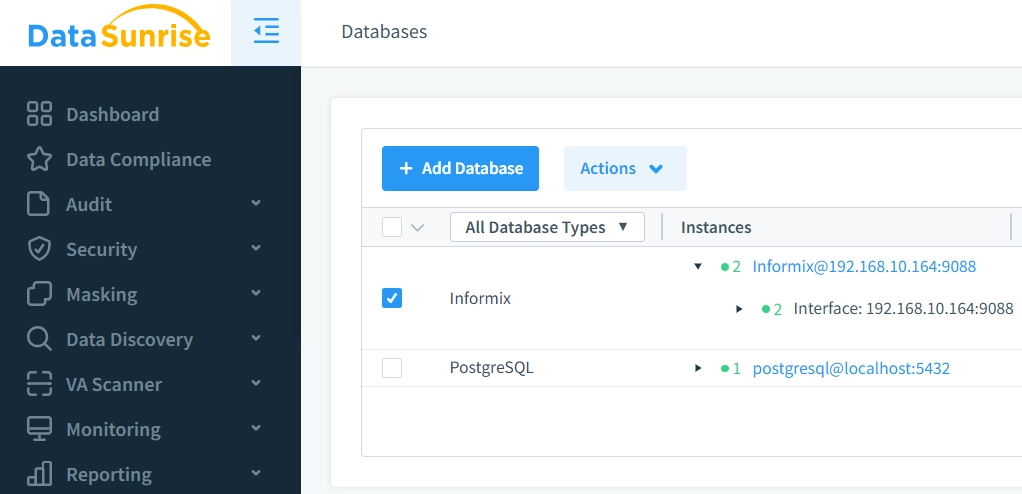
Step 2: Create an Audit Rule for Specific Tables
To monitor a specific table (e.g., a table containing sensitive data), create a new audit rule.
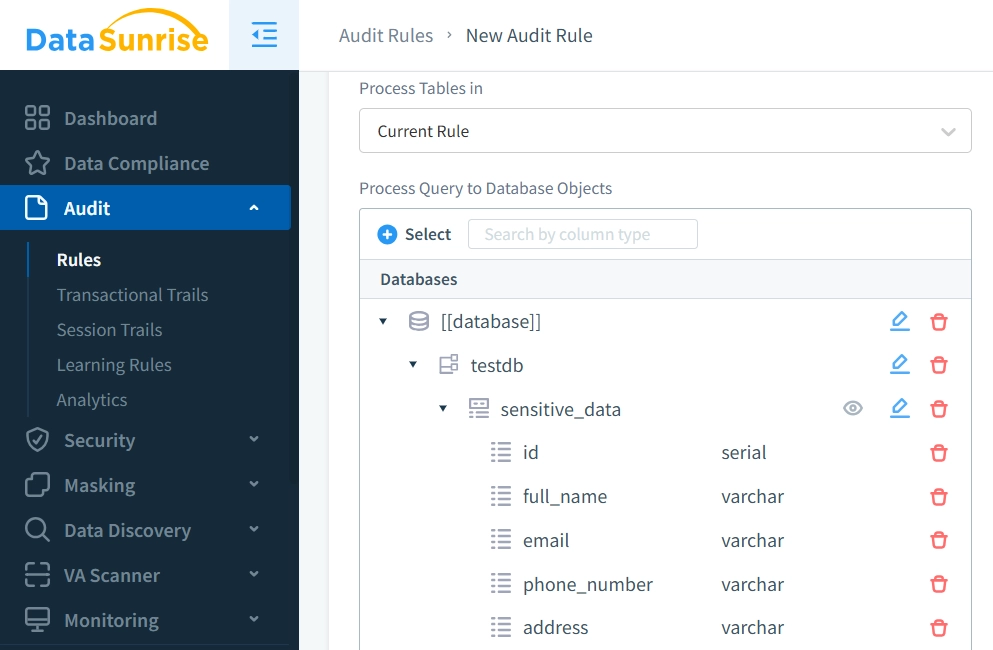
Step 3: View the Audit Trails History
Once the rule is created, DataSunrise will automatically start capturing audit events for the specified table. You can run some queries against selected objects and then view the audit trail in real-time, providing insights into who accessed the table, when, and what actions were performed.
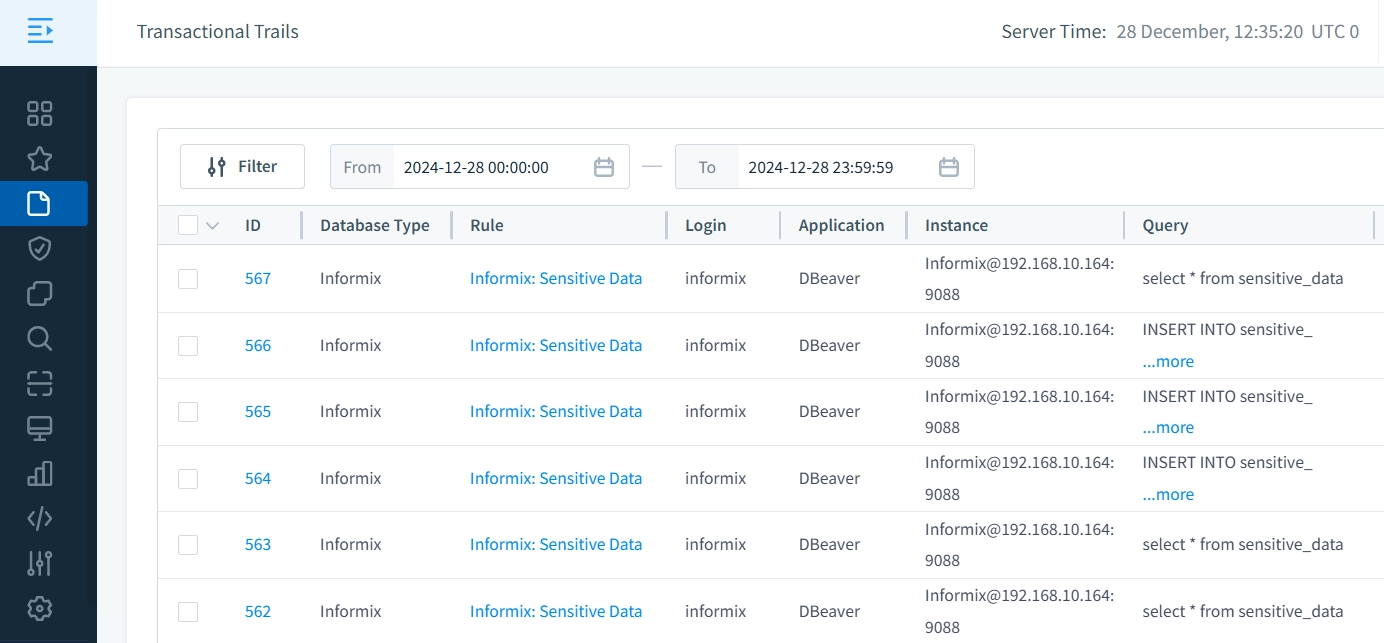
Step 4: Analyze Captured Activity
DataSunrise provides detailed visibility into Informix database actions, including user activity, queries, timestamps, and data changes. This enables effective monitoring, anomaly detection, and compliance. With the 'Create Rule' button in the 'Event Details' panel, you can quickly set up audit, masking, or security rules based on specific events for enhanced protection and control.
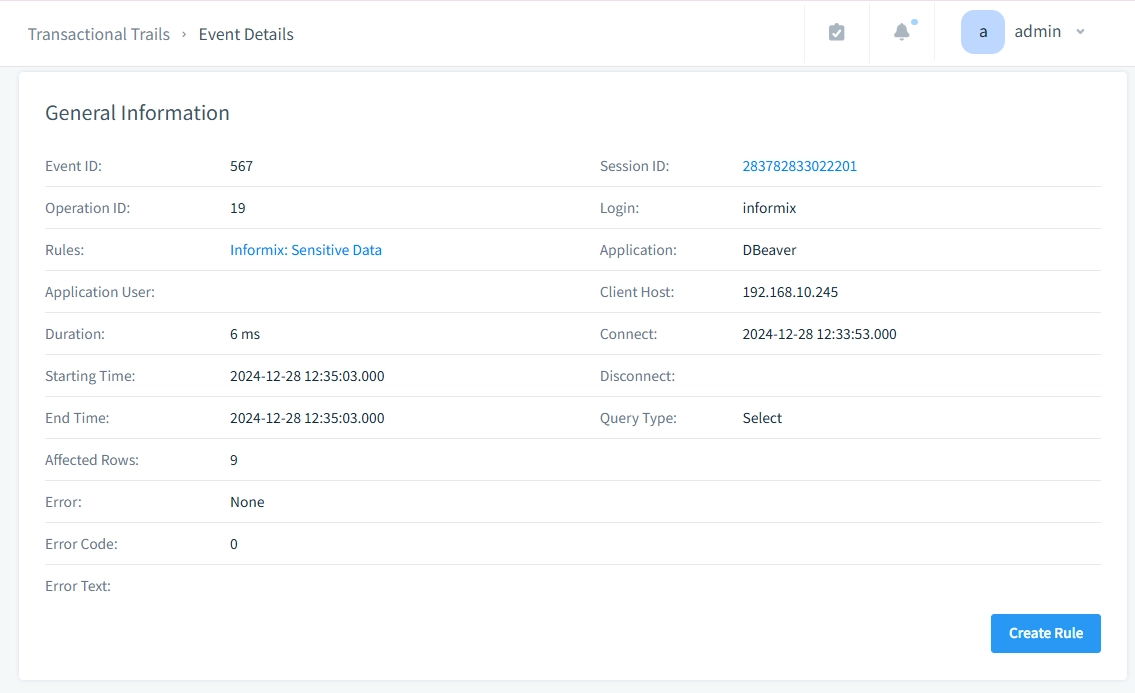
Key Advantages of DataSunrise for Informix
- Granular Audit Rules: Define which tables, columns, or actions should be audited.
- Centralized Monitoring: View and analyze data audit trails in real-time while managing all audit rules from a single interface, enabling faster detection of unauthorized activities and consistent security policy enforcement across databases.
- Integration with Other Security Tools: DataSunrise works alongside other security tools to offer comprehensive protection and auditing capabilities.
- Automated Compliance Reporting: Generate detailed compliance reports for GDPR, HIPAA, and other regulations automatically.
- Behavioral Analytics: Monitor and analyze user behavior patterns to detect anomalies and potential security threats.
- Intelligent Alerting: Receive instant notifications about suspicious activities through various communication channels.
Conclusion
Informix’s native auditing capabilities provide essential features for tracking and securing database activity. However, DataSunrise extends these capabilities by offering more advanced functionality, a centralized rule management system, and a user-friendly interface that simplifies the auditing process.
DataSunrise integration for Informix auditing can enhance your ability to monitor data access, detect anomalies, and maintain regulatory compliance.
Schedule a live demo today to experience the full potential of DataSunrise’s audit features and discover how it can simplify your data security and auditing needs.
